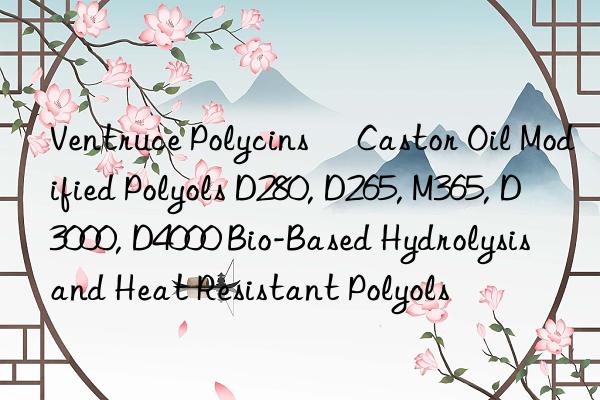
Product Introduction
Van Truus Specialty Products offers a new line of castor oil derived, low cost, 100% solids polyurethane polyols.
These new polyols are named POLYCIN® D, T and M series. These hydroxyl-terminated ricinoleate derivatives react with standard chemical isocyanates to form urethanes for coatings, adhesives, sealants, elastomers (CASE).
Product Features
Excellent electrical properties, low vapor hazard, easy handling, low viscosity, excellent permeability, room temperature curing, anti-reversion properties, thermal stability;
Low heat release, low stress, low temperature resistance, excellent moisture retention, low cost, 100% solid content, no volatile organic compounds (VOC)
· Hydrolytic Stability
The polyurethane system synthesized with POLYCINS® exhibits very good moisture and heat aging resistance under any conditions. For example, POLYCINS®-based systems not only passed but exceeded the requirements of the Navy's avionics test at 95% relative humidity and 100°C for 28 days.
· Low exotherm
Electronic components such as toroids, reeds, mercury switches, inductors, and selenium rectifiers are sensitive to stresses from packaging materials that can cause performance changes or even damage to components. The thermal sensitivity of electronic components and the avoidance of mechanical deformation require low heat dissipation. Polyurethane systems synthesized with POLYCINS® meet the requirement for low exotherm at temperatures averaging 85°F (29.4°C) above ambient.
Minimal shrinkage
Room temperature curing POLYCIN® elastomers show little or no shrinkage. This maintains the performance integrity of the finished system or product.
Temperature Stability
Test data show that POLYCIN® elastomer has remarkable thermal stability. Therefore, they guarantee a wide operating temperature range with a maximum interval temperature of 150°C.
Chemical and solvent resistance
The volume resistivity of the POLYCIN® system did not change after 6 months of contact with seawater. Immersing POLYCIN® elastomers in 10% hydrochloric acid and sodium hydroxide solutions for 7 days is completely unaffected.
The POLYCIN® system has excellent solvent resistance to aliphatic products (petroleum, heptane) and hydroxyl-containing materials (ethylene glycol). After soaking at room temperature for 7 days, there was little or no change in their linear dimensions. However, when using aromatic solvents (xylene), oxygenated solvents (acetone), and chlorinated solvents (tetrachloroethylene), some linear expansion may occur after 3 hours at room temperature.
Reactive diluent
In polyurethane resin systems, POLYCINS® provides an excellent means for reducing volatile organic compounds (VOC) and reducing viscosity. At the same time, it also has performance in improving hardness, elasticity, gloss, fluidity and wettability.
Security and Handling
POLYCINS® are non-toxic, biodegradable, and produced from renewable resources. Under normal storage conditions, its shelf life is at least two years.
Physical properties
|
Typical Performance |
DB®Oil |
D-120 |
D-140 |
D-265 |
D-290 |
T-400 |
|||||||
|
Viscosity@25℃, cP |
720 |
490 |
650 |
370 |
280 |
1,500 |
|||||||
|
Color, Gardner |
2 |
3 |
2 |
2 |
3 |
/p> |
— |
HB |
2B |
HB |
H |
HB |
HB |
|
Direct Impact, 140 lbs |
Pass |
— |
Pass |
Pass |
Pass |
Pass |
Pass |
Pass |
|||||
|
Reverse Shock, 140 lbs |
Pass |
— |
Pass |
Pass |
Pass |
Pass |
120 |
Pass |
|||||
|
200 butanone twice rub |
Pass |
— |
Pass |
Pass |
Pass |
Pass |
Pass |
Pass |
|||||
|
Sodium hydroxide 50% |
P |
— |
P |
P |
P |
P |
P |
P |
|||||
|
Toluene |
F |
— |
P |
P |
P |
P |
P |
P |
|||||
|
Acetic acid |
F |
— |
F |
F |
F |
F |
F |
F |
|||||
|
brake fluid |
F |
— |
P |
P |
F |
P |
P |
P |
|||||
|
water |
P |
— |
P |
P |
P |
P |
P |
P |
Note: NCO:OH=1.05:1.0HDT P=Pass F=Fail
Adhesives, Sealants, and Elastomers (ASE) Properties
|
Physical Test |
DB®0il |
D-120 |
D-140 |
D-265 |
D-290 |
T-400 |
|
Shore A hardness |
75 |
41 |
45 |
100 |
100 |
100 |
|
Shore D hardness |
25 |
— |
14 |
70 |
74 |
81 |
|
Stretchability, psi |
495 |
113 |
225 |
3200 |
4650 |
7600 |
|
Elongation, % |
80 |
60 |
185 |
135 |
200 |
15 |
|
Physical Test |
M-280 |
M-365 |
D1000 |
D2000 |
D3000 |
D4000 |
|
Shore A Hardness |
100 |
100 |
42 |
16 |
16 |
15 |
|
Shore D hardness |
77 |
82 |
|
|
|
|
|
Stretchability, psi |
5750 |
8100 |
150 |
40 |
39 |
43 |
|
Elongation, % |
20 |
10 |
70 |
75 |
70 |
65 |
Note: MDI is cured at NCO/OH=1.05/1.0
>Shore D hardness
77
82
Stretchability, psi
5750
8100
150
40
39
43
Elongation, %
20
10
70
75
70
65
Note: MDI is cured at NCO/OH=1.05/1.0

 微信扫一扫打赏
微信扫一扫打赏

